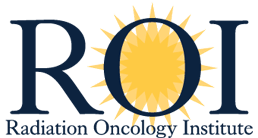
Every day, of every month, people are diagnosed with and treated for cancer.
And while the month of May has been designated as National Cancer Research Month, the Radiation Oncology Institute (ROI) – the ASTRO Foundation – believes that every month should be National Cancer Research Month.
The month that Katie Lichter, MD, MPH, started her medical training at the University of California San Francisco Department of Radiation Oncology, was the same month that Northern California was experiencing unprecedented wildfires during the COVID-19 pandemic. Dr. Lichter shared, “I quickly witnessed the parallels between maintaining the health of our environment and the health of our patients, recognizing that both are deeply interconnected.”
A pivotal moment for Dr. Lichter occurred when she admitted a patient with progressive lung cancer to the ICU. “His condition had worsened because he missed essential treatments due to his clinic closing and his lack of transportation amidst the wildfires ablaze and the ongoing heatwaves,” explained Dr. Lichter. “This experience brought home the harsh reality: climate change will directly impact my future patients and practice.”
In 2023, Dr. Lichter received a grant from ROI to lead a multidisciplinary team in a pioneering investigation into the disruptive effects of wildfires on radiotherapy delivery and its consequent impact on survival for patients with cancer. This work builds on her research to understand the environmental impact of radiotherapy that was published in Lancet Oncology this month.

While Dr. Lichter understands that this work isn’t easy, she emphasizes that “It’s necessary for a healthier future for our patients and our planet. There are structural barriers to change that individuals alone can't overcome. While personal actions like composting or recycling are important, we need systemic transformation. This includes cleaning up our energy grids, electrifying transportation and improving public transit. However, we can also take actions within our professional community. Highlighting this topic through publishing research or discussing it on platforms like this blog is one way. Incorporating environmental sustainability topics into medical education, conferences and research funding are others. We can all find small opportunities to incorporate sustainability into the culture of our clinics, whether it’s forming a committee, reducing single-use supplies, encouraging residents to do a quality improvement project focused on waste auditing, asking our patients about their ability to cope with an oncoming heatwave, or working with suppliers who are committed to sustainability,” explains Dr. Lichter.
With extremely low research funding available to accelerate radiation oncology, research projects like this are often overlooked despite their importance. ROI is committed to accelerating bold and innovative ideas in radiation oncology because cancer patients deserve the best research possible to live a longer, healthier life. And as a charity organization, the work of ROI is only possible because of ASTRO members who give generously.
In honor of National Cancer Research Month, ROI is asking you to join our President’s Circle with a gift of $1,500 or more each year, or only $100 for ASTRO Members-In-Training. Our goal is to celebrate more than 100 members of the President’s Circle during the ROI Luncheon at the ASTRO Annual Meeting this fall. To learn more about the President’s Circle including the benefits of joining, visit ROInstitute.org.


